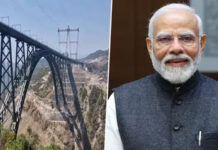UNITED NATIONS: India has called out Pakistan for co-sponsoring a UN resolution on culture of peace while rights of minorities are “emasculated” in the country, saying Pakistani law enforcement agencies stood as “mute spectators” when a historic Hindu temple was attacked and set on fire by a mob.
In December, a mob led by some local clerics and members of radical Islamist party Jamiat Ulema-e-Islam vandalised the Hindu temple and set it on fire in Terri village in Khyber Pakhtunkhwa’s Karak district. The attack drew strong condemnation from human rights activists and the minority Hindu community leaders, prompting Pakistan’s Supreme Court to order its reconstruction. “It is a matter of great irony that the country where the most recent attack and demolition of a Hindu temple took place in a series of such attacks and where the rights of minorities are being emasculated is one of the co-sponsors of the resolution under the agenda item ‘Culture of Peace’.
“The resolution cannot be a smokescreen for countries like Pakistan to hide behind,” India said in its statement on adoption of resolution on ”Promoting a culture of peace and tolerance to safeguard religious sites” on Thursday. The UN General Assembly on Thursday adopted the resolution that condemned all acts or threats of violence, destruction, damage or endangerment, directed against religious sites as such, that continue to occur in the world, and denounced any moves to obliterate or forcibly convert any religious sites. The resolution was co-sponsored by Pakistan along with 21 other nations. India, in the explanation of position on the resolution, cited attacks on the Hindu temple in the Pakistani town of Karak, against a Sikh Gurudwara as well as the destruction of the Bamyan Buddha in Afghanistan and said in the world of growing terrorism, violent extremism, radicalisation and intolerance, religious sites and cultural heritage sites remain vulnerable to terrorist acts, violence and destruction. “The images of the shattering of the iconic Bamyan Buddha by fundamentalists are still vivid in our memories.
The terrorist bombing of the Sikh gurdwara in Afghanistan where 25 Sikh worshipers were killed is yet another example of this vulnerability. “Most recently, in December 2020, a historic Hindu temple was attacked and set on fire by a mob in the town of Karak in Pakistan with explicit support and connivance with the law enforcement agencies which, stood as mute spectators while the historic temple was being razed,” India said in the statement. India reiterated its call for the application of the principles of objectivity, non-selectivity and impartiality to form the basis of discussions in the United Nations especially on the issue of religion. “The United Nations including the UN Alliance of Civilizations should not take sides and as long as such selectivity exists, the world can never truly foster a culture of peace. We must stand united against the forces that supplant dialogue and peace with hatred and violence,” the statement said. India joined the consensus for adoption of the draft resolution and acknowledged efforts of the co-facilitators of the negotiations, Saudi Arabia and Morocco, for their inclusive and transparent approach during the negotiations and piloting the “delicate negotiations” for achieving a consensus text of the resolution. Emphasising that it attaches great importance to safeguarding cultural heritage and religious sites, India cited the preamble of the Constitution that declares the country as a “sovereign socialist secular democratic republic” which secures to all citizens “liberty of thought, expression, belief, faith and worship”.
India told the General Assembly that it has strong legal framework for acts of violence or discrimination based on religion including violence targeted towards the places of worship. The UNGA resolution calls for strengthened international efforts to foster a global dialogue on the promotion of a culture of tolerance and peace at all levels, based on respect for human rights and for the diversity of religions and beliefs. It also strongly deplores all acts of violence against persons on the basis of their religion or belief and such acts directed against their places of worship, as well as all attacks on and in religious places, sites and shrines that are in violation of international law. The resolution expresses its concern that incidents of racial and religious intolerance, discrimination and related violence, as well as of negative racial and religious stereotyping, continue to rise around the world, and condemns, in this context, any advocacy of national, racial or religious hatred that constitutes incitement to discrimination, hostility or violence. The resolution urges states to take effective measures, consistent with their obligations under international human rights law, to address and combat such incidents.
It expresses “deep concern at the continued serious instances of derogatory stereotyping, negative profiling and stigmatisation of persons based on their religion or belief, as well as programmes and agendas pursued by extremist individuals, organisations and groups aimed at creating and perpetuating negative stereotypes about religious groups, in particular when condoned by governments.


























